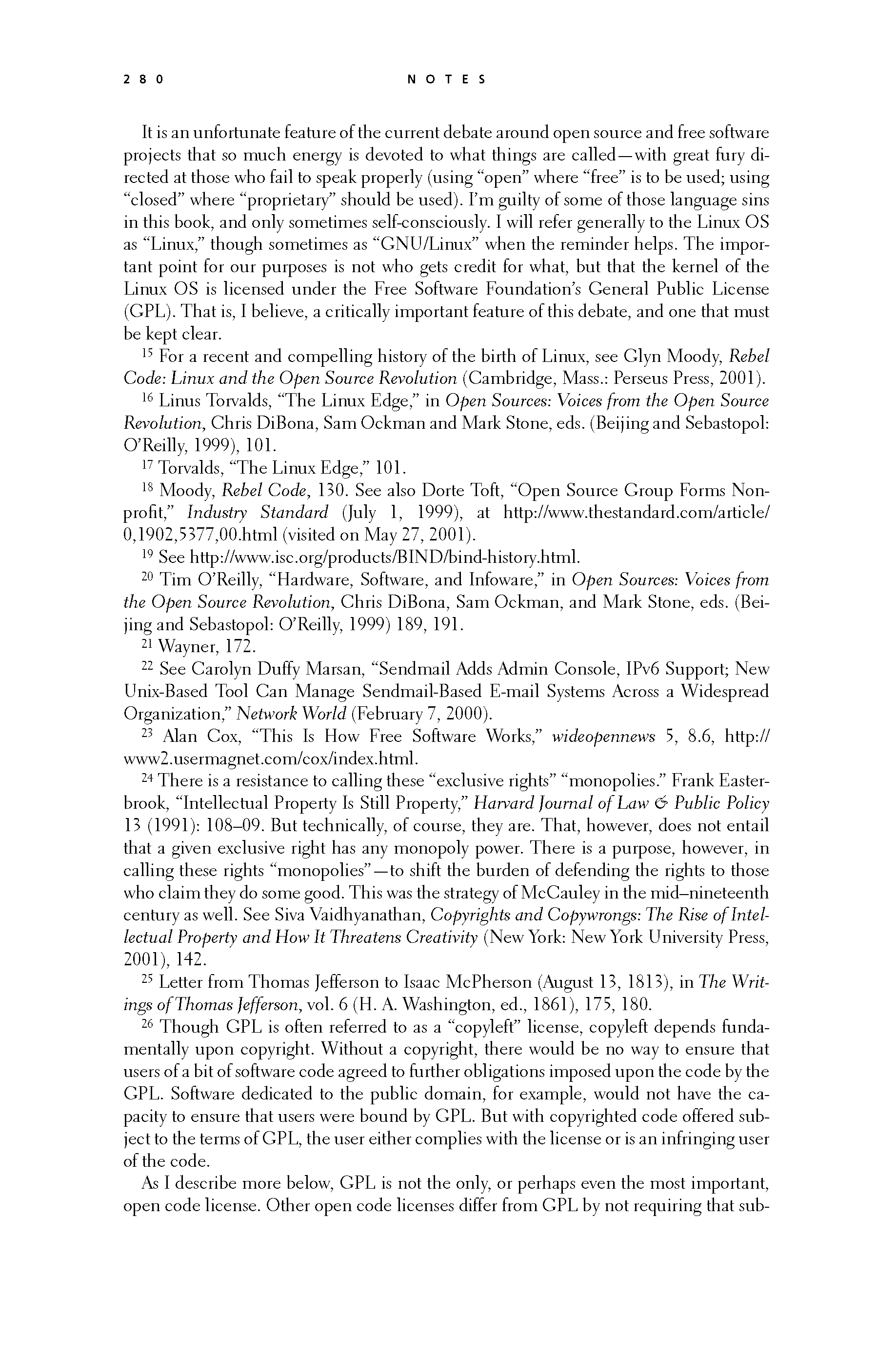 p279 _
-chap- _
toc-1 _
p280w _
toc-2 _
+chap+ _
p281
p279 _
-chap- _
toc-1 _
p280w _
toc-2 _
+chap+ _
p281
It is an unfortunate feature of the current debate around open source and free software
projects that so much energy is devoted to what things are called -- with great fury di-
rected at those who fail to speak properly (using "open" where "free" is to be used; using
"closed" where "proprietary" should be used). I'm guilty of some of those language sins
in this book, and only sometimes self-consciously. I will refer generally to the Linux OS
as "Linux," though sometimes as "GNU/Linux" when the reminder helps. The impor-
tant point for our purposes is not who gets credit for what, but that the kernel of the
Linux OS is licensed under the Free Software Foundation's General Public License
(GPL). That is, I believe, a critically important feature of this debate, and one that must
be kept clear.
[4-15] For a recent and compelling history of the birth of Linux, see Glyn Moody, _Rebel_
_Code:_Linux_and_the_Open_Source_Revolution_ (Cambridge, Mass.: Perseus Press, 2001).
[4-16] Linus Torvalds, "The Linux Edge," in _Open_Sources:_Voices_from_the_Open_Source_
_Revolution,_ Chris DiBona, Sam Ockman and Mark Stone, eds. (Beijing and Sebastopol:
O'Reilly, 1999), 101.
[4-17] Torvalds, "The Linux Edge," 101.
[4-18] Moody, _Rebel_Code,_ 130. See also Dorte Toft, "Open Source Group Forms Non-
profit," _Industry_Standard_ (July 1, 1999), at http://www.thestandard.com/article/
0,1902,5377,00.html (visited on May 27, 2001).
[4-19] See http://www.isc.org/products/BIND/bind-history.html.
[4-20] Tim O'Reilly, "Hardware, Software, and Infoware," in _Open_Sources:_Voices_from_
_the_Open_Source_Revolution,_ Chris DiBona, Sam Ockman, and Mark Stone, eds. (Bei-
jing and Sebastopol: O'Reilly, 1999) 189, 191.
[4-21] Wayner, 172.
[4-22] See Carolyn Duffy Marsan, "Sendmail Adds Admin Console, IPv6 Support; New
Unix-Based Tool Can Manage Sendmail-Based E-mail Systems Across a Widespread
Organization," _Network_World_ (February 7, 2000).
[4-23] Alan Cox, "This Is How Free Software Works," _wideopennews_ 5, 8.6, http://
www2.usermagnet.com/cox/index.html.
[4-24] There is a resistance to calling these "exclusive rights" "monopolies." Frank Easter-
brook, "Intellectual Property Is Still Property," _Harvard_Journal_of_Law_&_Public_Policy_
13 (1991): 108-09. But technically, of course, they are. That, however, does not entail
that a given exclusive right has any monopoly power. There is a purpose, however, in
calling these rights "monopolies" -- to shift the burden of defending the rights to those
who claim they do some good. This was the strategy of McCauley in the mid-nineteenth
century as well. See Siva Vaidhyanathan, _Copyrights_and_Copywrongs:_The_Rise_of_Intel-_
_lectual_Property_and_How_It_Threatens_Creativity_ (New York: New York University Press,
2001), 142.
[4-25] Letter from Thomas Jefferson to Isaac McPherson (August 13, 1813), in _The_Writ-_
_ings_of_Thomas_Jefferson,_ vol. 6 (H. A. Washington, ed., 1861), 175, 180.
[4-26] Though GPL is often referred to as a "copyleft" license, copyleft depends funda-
mentally upon copyright. Without a copyright, there would be no way to ensure that
users of a bit of software code agreed to further obligations imposed upon the code by the
GPL. Software dedicated to the public domain, for example, would not have the ca-
pacity to ensure that users were bound by GPL. But with copyrighted code offered sub-
ject to the terms of GPL, the user either complies with the license or is an infringing user
of the code.
As I describe more below, GPL is not the only, or perhaps even the most important,
open code license. Other open code licenses differ from GPL by not requiring that sub-
[[280]]
p279 _
-chap- _
toc-1 _
p280w _
toc-2 _
+chap+ _
p281